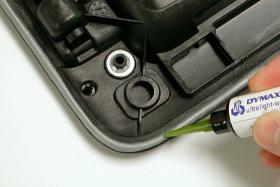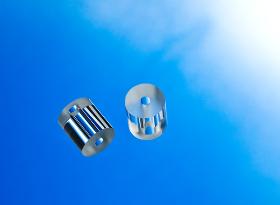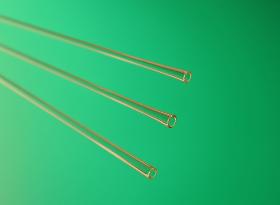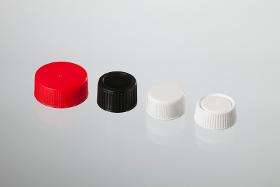- europages
- >
- COMPANIES - SUPPLIERS - SERVICE PROVIDERS
- >
- glass seal
Results for
Glass seal - Import export

DYMAX EUROPE GMBH
Germany
Dymax GA201 forminplace (FIP)/cureinplace (CIP) gasketing resin is formulated for sealing plastic, glass and metal enclosures, and plated surfaces for automotive door handle, appliance housing, and critical electronic assembly and device applications which require a soft, tackfree, flexible gasket. Features: - Cures with UV/Visible light - Moisture resistant - Chemical resistant - Tackfree cure - Soft, durable after complete cure - Conforms to intricate channels and recesses - Compliant with RoHS directives 2015/863/EU
Request for a quote
HILGENBERG GMBH
Germany
A sensor only is not a responsible for good measurement. Often it depends on the surrounding conditions. Thick-walled glass-capillary-sections serve for the sensor as solid basis. Fitted on top, the sensor is mostly islolated from thermal and other environmental impacts. Solid connections between glass and metal For the production of glass-feed-throughs or glass metal sealings, precise cuttings of capillary-tubes are needed. These special tubes are glasses, which are adjusted to the physical parameters of the metals. We draw and cut such capillaries precisely to final size. Thereby the glasses can be fused on the customers wires and pins, which are made of metal. Scatter discs for the endoscopy Glass rings in different sizes with two satin cut sides, allow to manufacture small ring lightings for example for the endoscopy. By means of the rough surfaces of the glass rings, the light, coupled on the back, is refracted and diffusely spread. Different diameters and thicknesses as...
Request for a quote
HILGENBERG GMBH
Germany
The major difference between our standard capillaries and conical capillaries lies in the different opening diameters on both ends. Whereas standard capillaries are manufactured with the redrawing-method conical capillaries are produced in a discontinuous process. Materials Soda-lime glass (AR, I860, PH360 etc.) gamma sterilized soda-lime glass Borosilicate glass (DURAN©, PYREX©, SIMAX© etc.) Neutral glass (FIOLAX© and DUROBAX©) Aluminum silicate glass (Schott 8252/8253) Lead glass (lead content up to 28%) Sealing glasses for various metals such as: kovar, molybdenum, steel, silver, platinum, palladium Process of Production During the production process of the conical capillaries a straight tube or capillary is heated and drawn. By drawing the capillary a pointy conical, tapered form, a so-called double-tip, is formed. The tip can be parted in the capillary’s smallest diameter and results in a larger diameter on one side which is determined by the blank used in the process, as...
Request for a quote
HILGENBERG GMBH
Germany
The distinctiveness of these capillaries is their very thin wall-thickness in relation to their diameter. The extremely thin walls lead to the special feature of these capillaries to be deformed easily. Additional features linked to the thin wall-thickness are minimal optical distortion as well as very low absorption for a wide range of radiation. This feature is used e.g. for the construction of optical measuring cells. Materials Soda-lime glass (AR, I860, PH360 etc.) Gamma sterilized soda-lime glass Borosilicate glass (DURAN©, PYREX©, SIMAX© etc.) Neutral glass (FIOLAX© and DUROBAX©) Aluminum silicate glass (Schott 8252/8253) Quartz glass (naturally melted quartz glass and synthetically produced quartz glass, incl. F300) Lead glass (lead content up to 28%) Sealing glasses for various metals such as: kovar, molybdenum, steel, silver, platinum, palladium Process of Production Like most of our capillaries the ultrathin capillaries are manufactured using the redrawing method....
Request for a quote
RÜHL FEUERLÖSCHMITTEL GMBH
Germany
GFK Systems PUR Systems Fire Extinguishing Agents Cleaning + Disinfection Infothek About us Contact Products Polyester Foam Resins Polyester Resins Applications Service Quality Newsletter Contact, Glass Fibre Reinforced Plastics Polyester Foam Resins Compared to conventional matrix systems for fibre-reinforced products, UP foam resins offer material and weight reductions of up to 30 % thanks to their micro-cellular foam structure. In simple sealed moulds, glass fibre reinforced plastic components that are smooth on both sides are produced cost-effectively under a vacuum in comparatively short cycle times. The production of sandwich components resistant to bending, with a foam core, and the direct integration of metal reinforcements and threaded elements – for example for large vehicle components – has also proven itself. Typical properties Dense matrix / composite of approximately 0.6–0.7 g/cm³ / 0.7–1.2 g/cm³ Fibre content 20-50% of total weight Moulded part mass per unit area of 3000–5000 g/m² Flexural modulus of elasticity 3000–8000 MPa Bending resistance of 35–185 MPa Impact resistance of 35–65 KJ/m² (with 20–35% glass content) Reinforcing materials: Continuous glass fibre mats Composite glass fibre and fleece mats Natural fibre mats Special formulations and versions Systems with long processing times for very large components Foam resin formulations with elevated dimensional stability under heat Systems for fibre-reinforced components with a high level of characteristics Coordination with gel coat / top coat for surface refinement Flame protection formulations Electrical industry: UL 94 V0 Rail vehicle construction: DIN 5510 (S4, SR1, ST2)
Request for a quote
DEMAREIS GMBH
Germany
Caps for all categories and all versions. With or without seal, for plastic containers or glass bottles. Also available with sealing film.
Request for a quoteDo you sell or make similar products?
Sign up to europages and have your products listed
Results for
Glass seal - Import exportNumber of results
6 ProductsCountries
Company type
Category